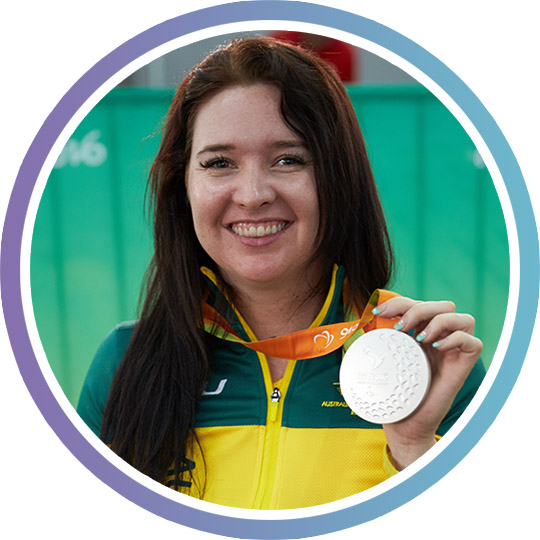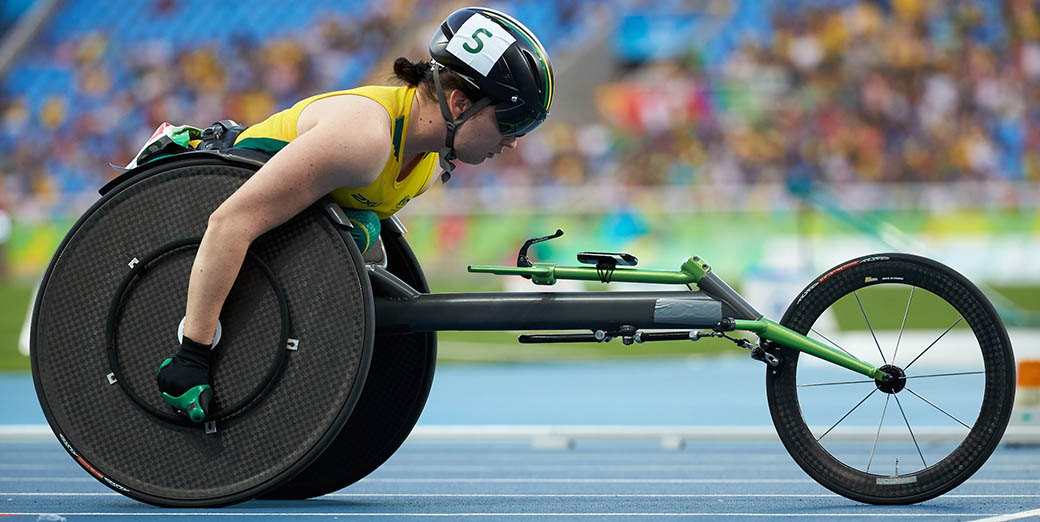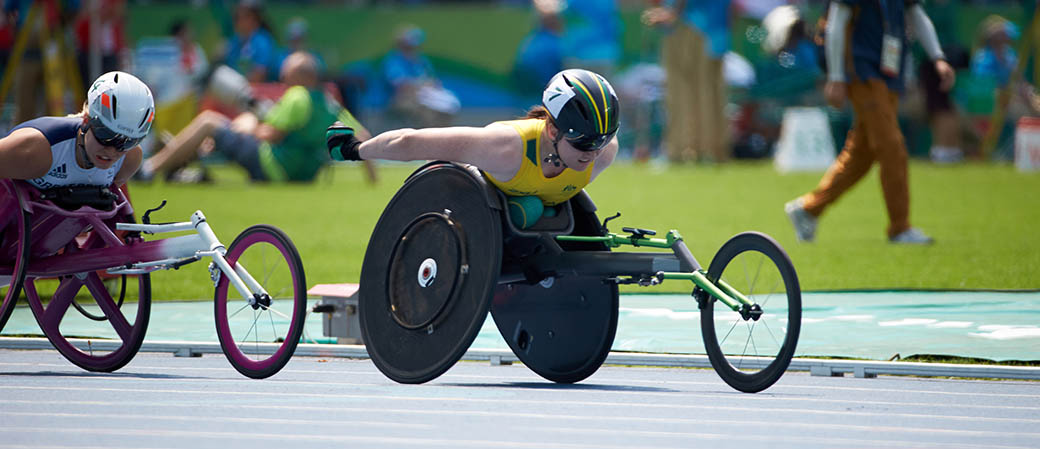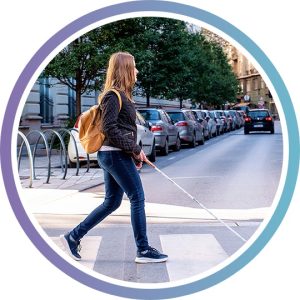
The weirdness of a delayed Paralympic Games held during a worldwide pandemic, and trying to focus on the job at hand.
A special feature by Angela Ballard, T53 Wheelchair Racer and Paralympian.
For me Tokyo 2020 was a beacon on the horizon of my athletic career. I’ve been racing internationally since 1998 and whilst I watch so many of more former teammates move on into coaching or their other lives, I can’t seem to give it up. I love what I do even though sometimes it feels like the worst; often times it’s also the best. One of the things that keeps me going is this rude idea of a perfect race at an amazing event with all the good feels and celebrations. Its unrealistic and I know that. Nothing is ever perfect but I’m being honest about what keeps me going for the big ones. The body, my body, is older and the mind a little more warped but I do love figuring out how to race fast and strong. In Sydney 2000 I was 18 years old and privileged to make my first team. I say privileged because it was early in my career and I benefited from a large team going to a home games. However I can barely remember it now. I was so nervous and overwhelmed that I can only remember pockets of that time. Ever since I’ve been chasing those awesome games but with a present and experienced mind-body ready to give it everything.
I saw the efficiency and character of the Japanese people as an opportunity for one of the best Paralympic Games ever. You might be surprised but Paralympic Games or any event run for hundreds or thousands of people with disability is usually not 100% accessible, has varying degrees of inclusiveness and is rarely designed with these things at the forefront. Now some may take issue with that assessment, but I feel as someone who’s used a wheelchair for over 30 years and attended six Paralympic Games now that I have good lived experience to comment on this. It honestly gets better every cycle (four years between games) and it’s awesome to watch each country really embrace and champion their athletes and community on a large scale. Although I think we can conclude after six games that maybe no one will ever get the transport issue sorted out. My vision of an awesome Paralympic Games is to marry the spectacle and celebration with absolute inclusion and accessibility and then throw in the awesomeness of Paralympic sport and racing my best. Obviously a lot to ask but hey, a girl can have dreams. Little did I know when I dreamed about these games that the last few years would bring a global pandemic, enormous stress and damage to disability communities around the world and a different normal for everyone.

So we adjusted. We always adapt and adjust right? That’s our job. As both an athlete and person with a disability life would be weird if I wasn’t on the front foot of problem solving, readjusting expectations and keeping my eyes on what really matters to me. But it’s definitely been a weird time. Like many, the build up to the games was interrupted with trips/competitions canceled, lockdowns, worries around ourselves and those we love. I know it’s been a privilege to able to continue with my athletic job. So much of the isolation and limits imposed during this time has affected many in new and challenging ways.
So what was different for an athlete? Well first when the games got delayed, I admit I was relieved. I was going through a hard time with my health and whilst I was making progress, I knew more time would allow me to do more work at a higher level. I also was worried, like many, that a Paralympic Games held in the midst of the COVID pandemic was going to be a poor outcome for so many. Naively I thought a year extra would mean everyone would be safer and it would be a good thing. In many ways the games were a burden filled with unknowns and risk. The Japanese people were coping with their own rise in case numbers, had already spent billions on hosting and were figuring out how to welcome people from all over the world without hurting their own people. It’s been a pressured lead up and at times I’ve felt no matter how it affected individuals, maybe it should have just been called off. But sport is a big machine with many moving parts (and dollars) and it seemed the closer we got, no matter what happened it was going ahead. So we prepared as best we could.
Sometimes plans would change every fortnight as we came in and out of lockdowns. As an athlete our focus is on following the training plan and controlling as much as you can. These times have taught me more mental flexibility than I thought possible. Whenever I had a sniffle (thank you sinuses) it was off for a test and training at home until a negative result came back. Anyone who has experience with nasal gastric tubes knows the pleasure (trauma) of patiently allowing someone to remind of you revolting times past. I now permanently have rollers (like a treadmill but for a race chair) and other equipment at home so I can train on my own without ever leaving the house. It lacks some diversity but I was grateful we could adjust. For athletes, missing even a single training session feels like it can add up to metres lost even a year down the track. One of the things that affected me the most during those times where we were all isolating ‘together’ at home was not being able to see my physiotherapist or soft tissue therapist. We can do so much communicating online, over Zoom and so I felt I could stay in touch with others, but my body hurts sometimes (always) and there’s nothing better than someone hurting you some more so you can feel and move better later.
Paralympics Australia and our sport leaders were very focused on what we could control and how to get the job done. They had two goals: get everyone COVID-free and ready to compete in their events; and secondly to get everyone home healthy and without impact to our communities when we returned. The Tokyo Paralympic Village houses 162 countries, 4,403 athletes and nearly as many support staff. Each morning before 8am we had to spit into a vial and drop it off for testing. We had to wear masks everywhere outside our bedroom, practice social distancing and hand wash, hand wash, hand wash. The main concern was if you got declared a close contact was that you and potentially half the Australian team would get shut down. If you acquired COVID then you would be removed from the village and put into the isolation. There were COVID infections in the village and you just couldn’t know when you might be exposed. Some of the best parts of going to a gigantic international event is meeting, catching up and sharing with people from other countries. But we had to stay focused and stay within our own our building in the village and try and prevent any chance of exposure. So that meant no dining hall (the 24/7 international food extravaganza open to all the countries), no socialising or watching other sports in person and only leaving the village to train or compete. ‘Get in, get out’ became the new motto.
Sometimes this was good. I’ve been to five games previously and I noticed my energy and focus was easier to maintain when we were only eating and sleeping and staying in a small area. But sometimes this was hard. My community is spread internationally and despite being so close physically we couldn’t risk mixing. My teammate Madison de Rozario won her first Gold medal at the Paralympics and we had to watch it from the warm-up track on the screen because no one was allowed to get closer than that in the stadium. I wanted to be there to yell and cheer for her. No one’s family could come and so our teammates were our family this time. But there were other nice bits – I feel like I’ve known more of my team and their performances than ever before and everyone tried to keep checking in with each other and cheering each other on. You felt this in the building and even out on the track in a stadium with only the officials and your competitors around you. Our team leaders gave us moments to gather as a team and share this experience together (with masks) and celebrate a weird and challenging but also pretty awesome time together. For some whose games were their first they will have a culture shock if they go onto a second but really every single games is different, spiced by the host country and people, the world and its movements and by where each of us are in our own lives and sporting careers.
Japan did an excellent job in really tough times but I still had my job to do. When I got ready for my first day of competition my nerves were like that at my first games. I sometimes think I’ll feel less sick and petrified but the build-up comes pretty hard and intense every time. All the worries come up about getting to the start line and doing your best and you have to control your thoughts and energy so you’re not exhausted before you even race. Many Australians athletes hadn’t competed against our counterparts for nearly two years. Whilst Europe and the Americas opened up to allow their athletes competition we were definitely one of the countries who stayed isolated. In some ways a benefit, but in others where racing is your job it was hard rocking up having more unknowns. Normally you’re super aware of your competitors’ strengths and weaknesses and how you compare and how to use that to your advantage. We had none of that prep and I felt that impact.
I felt with each successive race (I did three events and five races) I was getting closer to feeling that ‘racing normal’ which is actually a weird mixture of egotistical, risk-taking, adrenaline junky menace. You kind of have to let all the things that help you perform, such as confidence, energy, competitiveness and playfulness, come to the surface and you try to push down the things like doubt, politeness and being careful. Don’t get me wrong, I want to compete with integrity but you’ve got to back yourself and play hard. By the time we got to my last race I’d reacquainted myself with my egotistical-menace-racing persona and was excited to make it happen. My last race – my favourite, the 400m was in the rain and I drew lane seven. Not always a good thing but this time I felt it was in my favour. When you start in lane seven on the athletics track, you can only see one competitor in front of you and everyone else you race is behind you. It’s like you get a head start but when you get to the second bend all those people in the inside lanes will start to catch up as the stagger evens out. So the deal is that you have to be the little bunny that runs so very, very hard and hopes not to get caught. It is a mental as much as a physical challenge.

It was raining that night, an extra challenge with wheelchair racing, and 400 metre races are always kind of horrible no matter how fast you race – so you might as well race it fast. Even though it’s my favourite race, if I don’t feel like vomiting at the end then I haven’t done it right. So you go hard as you can, try and keep it all together when your arms become heavy and you’re wishing the finish line to move closer.
I started with that knowledge that if I was a good bunny they would have to chase me down and I love trying to conquer the hurt, so bring it on. I was really proud of that race. I came fourth. Someone asked after if that was the worst result. Not a medal, but oh so close. But for me it was huge. I’ve done something like 22 international finals at a Worlds Championships or Paralympics. I’ve medaled at Athens, Beijing, London and Rio but this last cycle has stripped me down and shown me again how hard we sometimes have to struggle for our goals but also our health and wellbeing. I experienced some tough years and despite working hard I seemed to be going slower than ever just two years ago. I had to reassess and push through many days waiting to feel good again. My choice, no pity needed, but sometimes that’s what is hard about this. We do it for the successes, the fun and the community but sometimes it sucks, it’s hard and we don’t get to choose our battles. We all have our journey and I know – really know – how much that fourth place cost me and how much I wanted it. I wanted to work hard, enjoy what I do and compete with other people on that similar journey. And I was able to bring that all together on my last race in Tokyo. We can’t always share the steps or moments of how hard or amazing or boring or significant it is that we do, but these games really brought home for me what my journey is, why I do what I do and why I want to help others find that too.
Back home now. We come out of lockdown soon, I’m already back training and I’m figuring out what’s next. Some will be helping my racing community continue to grow and compete in Australia, some will be continuing my own training, maybe all the way to Paris 2024 and some will be figuring out the new normal cause that’s always changing too. In the meantime, Commonwealth Games and World Champs are less than a year away and I’ve got work to do!



